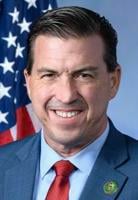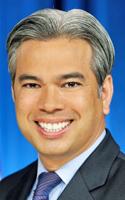The House has passed a roughly $1.2 trillion spending package to end a partial government shutdown. The bill next goes to President Donald Trump for his signature. The vote wraps up congressional work on 11 of the 12 annual appropriations bills, funding the vast majority of the government until Sept. 30. But there's one more funding fight to come. The last bill still to be worked out covers the Department of Homeland Security, where Democrats are demanding more restrictions on enforcement operations. Speaker Mike Johnson says he expects the two sides will be able to reach an agreement on Homeland Security funding by the deadline.
The House is pushing toward a vote on renewing subsidies for Affordable Care Act plans. It's a remarkable rebuke of House Speaker Mike Johnson, who tried to stop it. But renegade Republican lawmakers joined with Democrats on a so-called "discharge petition" to force action. The health care tax breaks have lowered health insurance costs for roughly 22 million people, but expired last month. The Congressional Budget Office said the proposed three-year extension would increase the nation's deficit by about $80.6 billion over the decade, and increase the number of people with health insurance by millions. Members of the Senate are working on an alternative bill.
Four centrist Republicans have broken with their party's leadership over health care. They've signed onto a Democratic-led petition that will force a House vote on extending for three years an enhanced pandemic-era subsidy that lowers health insurance costs for millions of Americans. The stunning move Wednesday comes after House Republican leaders pushed ahead with a health bill that doesn't address the soaring monthly premiums coming for those with insurance through the Affordable Care Act. A House vote on the subsidies could come as soon as January. Even if it passed, it would face an arduous climb in the Republican-led Senate.
As the end-of-year deadline to extend Affordable Care Act subsidies quickly approaches, lawmakers are struggling to come up with a solution th…
Cuts to America’s complex health care system have been the tinder for increasingly inflammatory political fights in recent months — expiring A…
As the House voted to end the longest federal shutdown in American history, San Mateo County congressional leaders were a firm no vote, citing…
President Donald Trump has signed a government funding bill that ends a record 43-day shutdown. The disruption caused financial stress for federal workers who went without paychecks, stranded scores of travelers at airports and generated long lines at some food banks. The signing ceremony came just hours after the House passed the measure on a mostly party-line vote of 222-209. Democrats wanted to extend an enhanced tax credit that lowers the cost of health coverage obtained through Affordable Care Act marketplaces and refused to go along with a spending bill that did not include that priority. But Republicans said that was a separate policy fight to be held at another time, and they prevailed.
After refusing to convene the U.S. House during the government shutdown, Speaker Mike Johnson is recalling lawmakers back into session. They are set to consider the bill to reopen the federal government on Wednesday. As hundreds of lawmakers return they are bringing pent-up legislative demands after nearly two months away. There are calls to release the Jeffrey Epstein files and swear-in Arizona's Rep.-elect Adelita Grijalva, who won her special election back in September. It's all a test of the speaker's leadership and shows the ways he has amassed power alongside President Donald Trump.
Republicans are swatting down an offer from Democrats to end the government shutdown. Senate Majority Leader John Thune said the new offer from Democrats is a "non-starter." The proposal from Democrats would reopen the government and include a one-year extension of expiring health care subsidies. It's unclear what may happen next. Thune suggested a weekend session of the Senate was possible, and idea that President Donald Trump endorsed in a social media post. Despite the stalemate, lawmakers in both parties were feeling increased urgency to end the shutdown, which has now lasted for 38 days.
California is taking all legal steps possible to defend the state against the Trump administration’s incursions — including taking the federal…

















